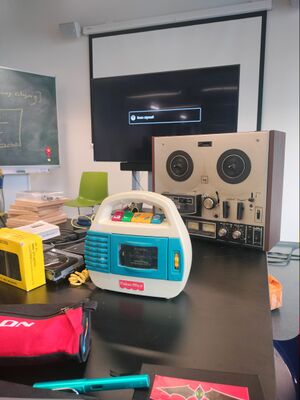Reel-to-Reel Experimentation (Wordhole): Difference between revisions
No edit summary |
No edit summary |
||
| (5 intermediate revisions by the same user not shown) | |||
| Line 1: | Line 1: | ||
[[File:Reel to reel.jpg|thumb|Reel to Reel and cassette recorders]] | [[File:Reel to reel.jpg|thumb|Reel to Reel and cassette recorders]] | ||
'''Process | '''Process''' | ||
(a) A team comes together and has a reel-to-reel tape recorder and at least one tape at its disposal. | (a) A team comes together and has a reel-to-reel tape recorder and at least one tape at its disposal. | ||
(b) The team listens to the tape in order to test if it's still in working condition | (b) The team listens to the tape in order to test if it's still in working condition. Other reasons to listen are plain curiosity or in order to choose pieces the team would like to keep and integrate in a new recording. For example in one case it was a militaristic anthem, in another an aria, in a promising Joan Baez recording there was nothing, as the tape had been demagnetized. | ||
(c) The team might choose to record directly on top of the tape or proceed first to step (d) and then record. Recording takes place directly through microphone(s) and its speed can be manually adjusted by pulling the tape or holding and releasing, or even speeding up the movement of the casing while the tape rolls. | (c) The team might choose to record directly on top of the tape or proceed first to step (d) and then record. Recording takes place directly through microphone(s) and its speed can be manually adjusted by pulling the tape or holding and releasing, or even speeding up or slowing down the movement of the casing while the tape rolls. | ||
(d) The team members proceed to cutting the tape | (d) The team members proceed to cutting the tape as needed, using a razor on a slicing plate, and then reconnect the tape pieces with special tape. | ||
(e) The last step is to play the new tape (or indeed the loops) created and make adjustments where needed. | (e) The last step is to play the new tape (or indeed the loops) created and make adjustments where needed. | ||
(f) The result can be further recorded using | (f) The result can be further recorded using a cassette tape recorder or digital means. | ||
'''Purpose''' | |||
Explore the possibilities of physical tape and the potential crossing with digital media. | Explore the possibilities of physical tape and the potential crossing with digital media. | ||
[[Category: Wordhole]] | [[Category: Wordhole]] | ||
Latest revision as of 16:25, 1 November 2023
Process
(a) A team comes together and has a reel-to-reel tape recorder and at least one tape at its disposal.
(b) The team listens to the tape in order to test if it's still in working condition. Other reasons to listen are plain curiosity or in order to choose pieces the team would like to keep and integrate in a new recording. For example in one case it was a militaristic anthem, in another an aria, in a promising Joan Baez recording there was nothing, as the tape had been demagnetized.
(c) The team might choose to record directly on top of the tape or proceed first to step (d) and then record. Recording takes place directly through microphone(s) and its speed can be manually adjusted by pulling the tape or holding and releasing, or even speeding up or slowing down the movement of the casing while the tape rolls.
(d) The team members proceed to cutting the tape as needed, using a razor on a slicing plate, and then reconnect the tape pieces with special tape.
(e) The last step is to play the new tape (or indeed the loops) created and make adjustments where needed.
(f) The result can be further recorded using a cassette tape recorder or digital means.
Purpose
Explore the possibilities of physical tape and the potential crossing with digital media.

